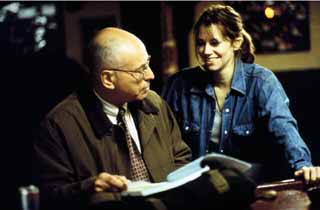Happy Trails to You
Writer-director Jill Sprecher journeys toward enlightenment in "Thirteen Conversations About One Thing"
By Piet Levy, Fri., July 5, 2002

Jill Sprecher sits in an upscale hotel room on an uncomfortable stool-type chair. Bubbly yet engagingly proper, her cute Wisconsin accent quickly relieves any awkwardness. She is genuinely kind. At first I'm too comfortable to notice a certain quietude to her character, or that I'm sitting in the cushy chair. I suspect this is intentional. Much like her films, Sprecher is a complicated enigma, an Eisenhower-era hostess who puts me at ease at the expense of herself. When I try to steer our airy banter toward more serious conversation, she redirects the focus back to me. She is a voyeur and an exploitation artist, using a personal history of isolation and pain to inform her stories.
Born and reared in Madison, Wis., Sprecher made her directorial debut with Clockwatchers in 1997. She and her younger sister Karen co-wrote the indie feature, drawing from their own personal experiences of tedious temp. work and the cutthroat nature that evolves when humans are trapped in claustrophobic cages. The film, an acidic analysis of human nature, flashes humorous glimpses throughout while maintaining its tragic sense of irony. We would be laughing if the characters and story weren't so painfully true. Human behavior, Sprecher's tapestry of choice, is a prickly pear, and only in the difficult examination of it can she indirectly overcome the ghosts of her past.
And now, after years simmering over those ghosts (filling the void with even more temping), Sprecher and her sibling co-scribe are back with a more expansive picture. Thirteen Conversations About One Thing satisfies the current flavor of art films, l'ensemble du cinema, as it traces the lives of various New Yorkers and the ways they affect each other and themselves in their quest for happiness. The results are mixed and bittersweet. "It's scary that whenever you talk about happiness and things that really are meaningful, they sound like greeting cards," Sprecher comments, seconds before a boisterous giggle. Still, it's the muted struggle for happiness that informs Sprecher's work, born out of the director's own quiet upbringing.
"I grew up a middle child," she states with her arms crossed timidly, "so I stayed out of the way. I was too shy to eat in the cafeteria until about my senior year, so I would eat in the bathroom stall." (That image is depicted to a painful degree in Clockwatchers.) Sprecher remained in the shadows, too afraid to watch the world directly if it in turn watched her. But where is the satisfaction in perusing the lives of others when there is no celebration of your own? After studying philosophy at the University of Wisconsin in Madison (a subject that influences her writing), Sprecher sought to shake off her passivity, lured by the bustling promise of an urban paradise -- New York City.
"I actually think it was film that inspired me to move to Manhattan," says Sprecher. "I loved to see Woody Allen movies, and I loved the image of Manhattan that I saw in film. The day I graduated, I got on a plane and moved there and didn't know what I wanted to do but just knew where I wanted to live. But of course the Manhattan I lived in didn't resemble that at all. It didn't have a Gershwin score!" Nevertheless, Sprecher was a dreamer, eager to escape the quiet reserve of her youth. But while attempting to embrace the best and brightest of her new surroundings, she suffered a crushing setback.
Sprecher's vocal tone remains high, as her smile grows fainter. "Every street corner held great possibilities, and the people were wonderful. And then I was mugged within a three-month period twice in New York. The second time, a guy hit me in the head with a bottle, and I had to have brain surgery. I had my head shaved and started to become very suspicious of people, and, even following that brain surgery, I had a lot of bad luck."
The spell is temporarily broken as someone rings the suite doorbell. Sprecher takes the moment to lighten up, making a joking reference to Girl Scout Cookies, then in that same breath returns to her story. "I had been told by the neurosurgeon, 'Don't ever get hit on this [right] side of your head again.' A year afterward, I was sitting on a subway car. And I think I just didn't deal with this mugging thing, and a lot happened to me afterward. And my hair had grown back by then a little bit, but a guy walked by and slapped me on the head and kept walking. Right there! I think I was projecting, 'I am a victim. Come and get me.' That's the only explanation. And I just sat there in tears, and there's nowhere more private than to be on a subway car in New York surrounded by people. But I happened to notice this one man across from me who saw this and was going to get up and go after the guy, but the slapper moved on to the other car. So the man across from me just sat back down and smiled, and it was great. For a year I had been thinking 'people are so cold here, they are so mean.' But for me that was a revelation."
Sprecher had found it. She shed her self-pity, forgave her surroundings, and began embracing New York and its film culture. And now kindness, for Sprecher, is as easy to find as pain, and both often exist on the same street corner. "It really is about your attitude," she reveals. "There have been studies where psychologists have gone around the world and asked people, 'Do you consider yourself happy or unhappy?' And it's interesting, because even in poverty-stricken countries, the incidents of people who consider themselves unhappy is no higher than it is here, where we live in the free world. So it really doesn't have anything to do with your external circumstances. It's really mental; it's a mental construct, and we ourselves are responsible with a lot of things that create unhappiness. We may not have control over whether or not we get hit by a car, but we have control over how to view that incident."
With this approach, as well as heavy research in psychology and philosophy, Jill set out with Karen to write Thirteen Conversations. Many of the characters reflect the attitudes one can choose to have and the triumph or tragedy that stems from these choices. A dapper Matthew McConaughey represents guilt, playing an assistant district attorney totally assured of the judicial system. His privileged life crumbles after a tragic, indecent action he tries to forget but never forgives. Meanwhile, John Turturro is boredom, a stuffy physics professor combating his midlife crisis in "new dynamic ways," only to incorporate it again into the dullness of routine he sought to escape in the first place. And in the most compelling story line, Alan Arkin is envy, a constipated corporate middle manager who soon becomes weary, then malicious, towards his amiable employee, an everyman with boundless optimism and benevolence. The primary female characters, played by Clea DuVall and Amy Irving, are variations on Sprecher herself, each seeking equilibrium in a sometimes-merciless world. But to call the characters mere representations does not suffice. Sure, they may quote Plato and Bertrand Russell, but they retain the deep humanity that makes philosophy so interesting in the first place.
All in all, it was the confrontation with her past, written out in her films, that improved Sprecher's outlook and enriched her storytelling. "Obviously, when I was going through some of this I could see nothing positive in it. But now, given the beauty of time and some distance, I really believe that incident helped me. I wouldn't be directing a movie now without it. ... I became a lot more assertive after that, not in a pushy way. But in a way, where like, 'Gosh, you don't know how long you are on this earth.' And I was always the one to just sit there. And I thought, 'I don't have much to lose.' And I also realized, if I can live through this I'm stronger than I thought I was."
Pushing aside her "Emily Dickinson tendencies," Jill Sprecher, the shy Midwesterner with the folded arms, has now embraced her extroverted self. A director, a writer, an observational personality, she showcases re-created life events more piercingly true than any conjured-up fiction can provide. Perhaps there is no need for her to shed her past. But what of happiness? While offering her own observations and incidences to both the viewers' benefit and her own, Sprecher doesn't hint at a secretive solution. She has no need to. When happiness is in question, when satisfaction is on the line, there is no resolve. There is no fade out, no synoptic revelation, no pat resolution. Life doesn't plateau. In short, Sprecher has discovered the greatest insight of all. There is no answer. Except for the question itself. ![]()
Thirteen Conversations About One Thing opens in theatres Friday. See Film Listings for review.






